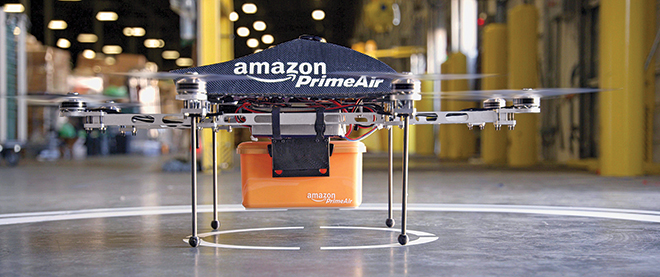Amazon’s sky-high drone plan
Colby Cosh on innovation that’s above and beyond
Amazon/AP
Share

Amazon CEO Jeff Bezos created much mirth and considerable anger last weekend with his appearance on CBS’s 60 Minutes. Bezos did something he doesn’t do often: He let genial interviewer Charlie Rose bring cameras inside one of Amazon’s enormous regional distribution centres. The centrepiece of the broadcast, though, was a demonstration of an experimental airborne delivery drone branded “Amazon PrimeAir.” Bezos showed a delighted Rose a video of an autonomous mini-copter taking off with a five-pound package and delivering it to the doorstep of an attractive Median American Suburban Family.
The five-pound limit, Bezos noted, covers 86 per cent of the items that Amazon delivers. The übernerd spoke vaguely of 30-minute aerial delivery: “I don’t want anybody to think this is just around the corner,” he added, but suggested that the first PrimeAir flights could be “four, five years” off. That figure is surely promotional bunkum and, as some people have pointed out, a peek at cute gadgetry seems like a small price for 14 minutes and eight seconds of prime-time network advertising. Jeff Bezos is, like other members of his species of American capitalist, about half Thomas Edison and half P.T. Barnum.
But given the bitter skepticism with which the PrimeAir drone was greeted, one cannot help adding that there is a broad streak of genuine visionary in Bezos, too. Tech columnist Dan Lyons castigated Bezos’s 60 Minutes appearance as an attempt to deflect attention from a new book documenting the CEO’s penny-pinching and his rude treatment of executives. Really, we think Jeff Bezos isn’t sincere about logistics innovation? A guy who has thrown untold millions of dollars at space flight—who, for example, personally paid to have an engine from Apollo 11 retrieved from the ocean floor—is interested in applications for unmanned aviation, just because it makes for a handy-dandy media distraction?
Most likely, he’s interested in the potential of commercial drone aircraft because it’s a pretty interesting idea. His video clip was greeted with catcalls about safety from Americans who, I guess, think the crap they now order by Amazon Prime gets to them by means of the Hogwarts Express. This is a newsmagazine, so here’s some news: Most of Amazon’s “fulfillment” is done with trucks. The company is silent about fleet miles in its annual report, but I promise you some bean-counter knows to the nearest integer how many people its shipping activity killed on American roadways last year.
It is a good thing the automobile was invented when it was; they would never let one out of the garage now. Commercial drones, alas, do not have the advantage of familiarity—any more than do Google’s self-driving cars, another potentially life-saving, Earth-friendly transport technology that is currently butting up again 21st-century regulatory stupidity and public hostility.
Bezos described his mini-copters as “very green,” but you don’t actually have to pray to Gaia at night to be frustrated about how little progress we have made away from an automotive-centric civilization. We went from Kitty Hawk to the Douglas DC-3 in the space of exactly 32 years, but you are pretty much still driving your father’s Oldsmobile, give or take some safety features. And maybe a cup holder. Though some car companies still haven’t even got the cup holder right.
A shocking amount of the Western world’s recent economic growth has come from logistics experts at businesses like Wal-Mart figuring out how to shorten supply chains, to shrink inventories and, as 60 Minutes’ Amazon piece depicted, to just plain stack and store stuff more compactly. But efficiency gains in the “last mile” between warehouse and home remain elusive. That is why Amazon gives away its Kindle reader at cost: to take trucks off the roads. Drone experimentation is another attack on the same problem, as it relates to goods which cannot, unlike books, be transformed into pure bits.
Bezos probably assumed people would make this causal connection on their own. Instead, they fantasized about future 21st-century highwaymen “shooting down” or capturing Amazon PrimeAir drones, as if that were a serious logical objection. Some of the people imagining criminal careers built on intercepting beef jerky and John Grisham novels probably take their bicycles to work and have actually had to replace stolen ones once or twice. The difference between a drone and a bike, of course, is that your bike probably doesn’t have a webcam, a GPS unit or an RFID radio transmitter. And, come to think of it, why doesn’t it?